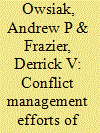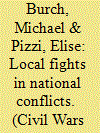| Srl | Item |
| 1 |
ID:
133586


|
|
|
|
|
| Publication |
2014.
|
| Summary/Abstract |
Motivations for conflict management are rarely discussed in terms of commitments that potential third-parties have toward one or both disputants. The current study addresses this lacuna by examining how alliance designs affect conflict management behavior. Specifically, we argue that third-party states' willingness to manage interstate conflicts depends on both the existence and depth of an alliance relationship. We test this argument using data on conflict management within militarized interstate disputes during the period 1946-2000. We find that allies are more likely than non-allies to manage their partner's disputes. Underneath this aggregate relationship, however, we also find that the depth of alliance commitments strongly influences this behavior. Deeper commitments - both across and within alliance types - increase the likelihood of conflict management significantly
|
|
|
|
|
|
|
|
|
|
|
|
|
|
|
|
| 2 |
ID:
131760


|
|
|
|
|
| Publication |
2014.
|
| Summary/Abstract |
How do rebel groups determine their targets during intrastate conflict? We build upon two competing theories in conflict studies that emphasize either the social or economic determinants of violence during war and use geographic information systems (GIS) analysis to explore these competing theories. To do this, we utilize a subnational analysis of the most likely case of the Democratic Republic of the Congo to understand whether ethnicity or natural resources motivates the location of conflict events. Accounting for geography, we find that economic endowments in the form of natural resources are highly related with the number of violent attacks, while the presence of competing ethnic groups does not offer much help in understanding the location of conflict events.
|
|
|
|
|
|
|
|
|
|
|
|
|
|
|
|
| 3 |
ID:
148152


|
|
|
|
|
| Summary/Abstract |
Approximately one-third of all interstate conflicts are multilateral, with the majority of these having a coalition of states fighting on at least one side. Despite the frequency of coalition wars, coalitions have not received much attention within the conflict literature. This paper presents the first general study on the effectiveness of coalitions during interstate wars. While there are many drawbacks to fighting as part of a coalition, the benefits of cooperation outweigh the cost, making coalitions more likely to win wars. An empirical examination of war outcomes between 1816 and 2007 confirms this hypothesis; coalitions have greater odds of victory than states fighting outside a coalition. This finding holds after controlling for possible endogeneity and selection bias.
|
|
|
|
|
|
|
|
|
|
|
|
|
|
|
|